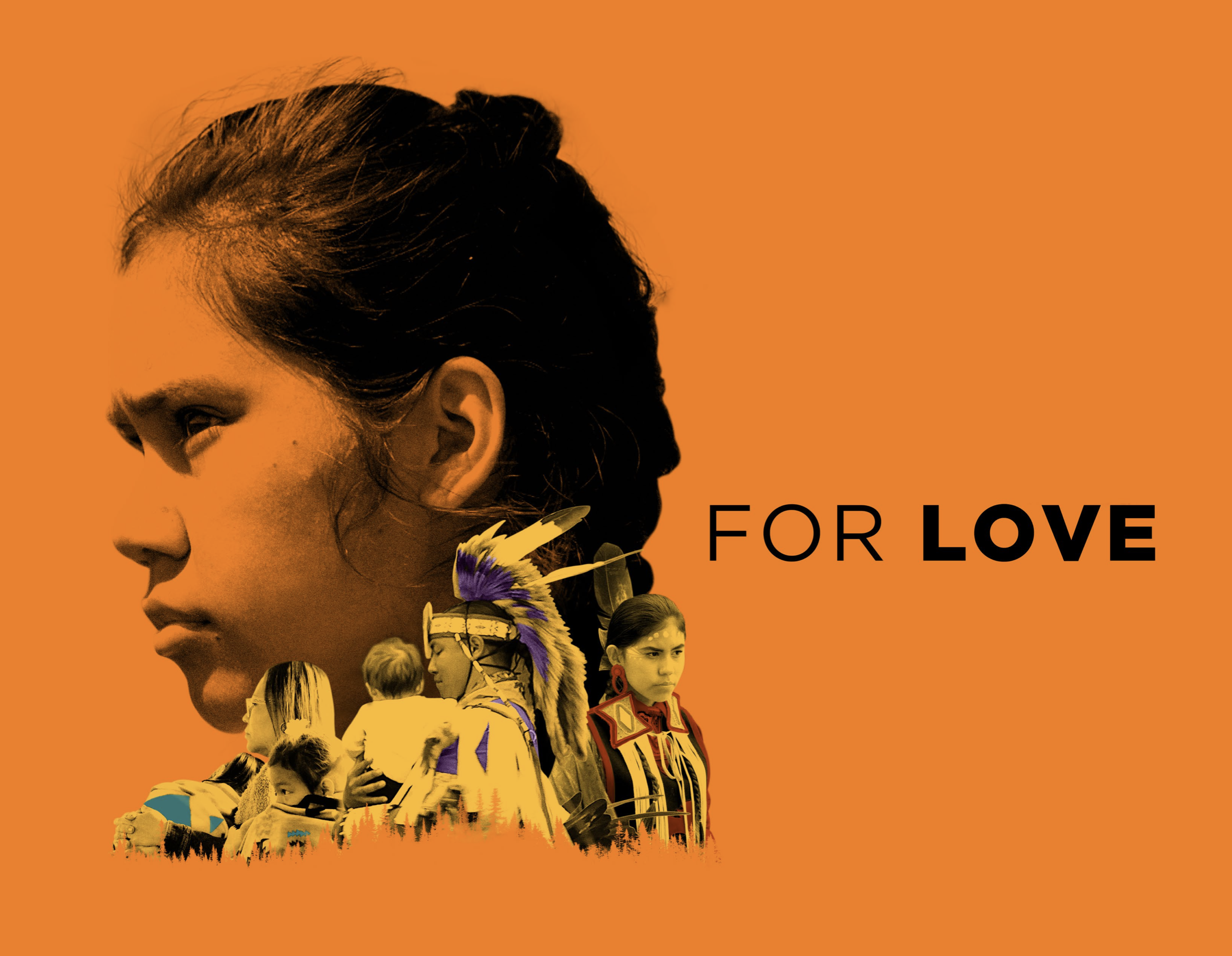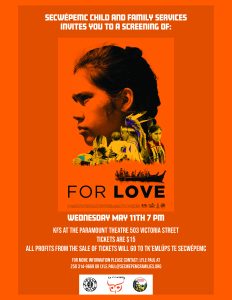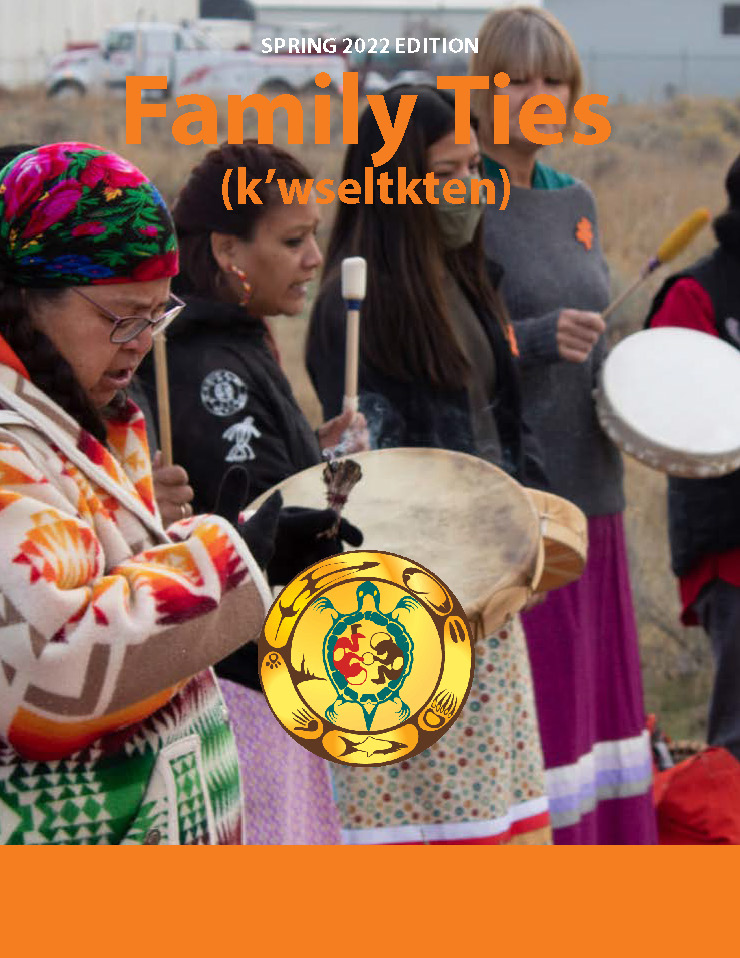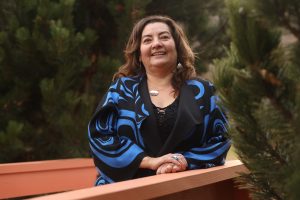Indigenous adults with intellectual and developmental disabilities in the Kamloops, or Secwépemc nation area, can now receive support and community inclusion services directly from an established Indigenous service provider, after a collaboration agreement was signed September 15, 2023.
The Memorandum of Understanding is between Secwépemc Child & Family Services Agency (SCFSA), a provider of services to urban Indigenous individuals, representing seven Indigenous bands in the Kamloops area, and Community Living BC (CLBC), a provincial crown agency that funds services for adults with intellectual disabilities. The agreement was celebrated in a ceremony that involved SCFSA dignitaries, CLBC leadership and the Minister Sheila Malcolmson, Minister of Social Development and Poverty Reduction. The ceremony was witnessed by Band Chiefs and council and community members, Elders, youths, families, SCFSA and CLBC staff.
“SCFSA is looking forward to this collaboration with CLBC, which will create Secwépemc-based, community-inclusion programs that serve our Secwépemc communities and urban Indigenous clients,” said Marshall Gonzales, SCFSA Board President.
“We are always looking to find new ways to meet the needs of the communities we serve and to better support clients with diverse abilities, and this agreement ensures that that they will be able to continue to access services they need, in the communities where they live, when they age out of the system, maintaining that vital connection to culture, community and family.”
“This agreement is important because it demonstrates how we can collaborate with Indigenous partners to create culturally appropriate relationships,” said Ross Chilton, CEO of Community Living BC. “At CLBC we’ve been building toward this milestone for years, by growing our Indigenous Relations team, and working with our Indigenous Advisory Committee and Elders Advisory Council to acknowledge the harms of our colonial past and work towards advancing reconciliation. Now we are partnering with SCFSA to build capacity for the Secwépemc nation to be self-determining over their programs, services, and policies.
The unique agreement ensures that each of the seven bands will have jurisdiction over how they want to receive CLBC funded services through SCFSA. The agency, a provincially delegated Indigenous Child & Family Service Agency, already provides full child protection, cultural, and prevention services for Indigenous children and youth in the area.
“We’re working to clear the path to remove barriers for people with disabilities”, said Sheila Malcolmson, Minister of Social Development and Poverty Reduction. Her ministry oversees CLBC, which is providing funding initially for five people with complex needs, who have recently become adults. “Indigenous people with intellectual and developmental disabilities in Kamloops can now stay in their own home communities, supported and surrounded by Secwépemc culture and teachings.” Minister Malcolmson also pointed out that this new agreement honours the government’s commitment under the Declaration on the Rights of Indigenous People Act.
The MOU will be supported through an ongoing monthly partnership committee made up of CLBC and SCFSA representatives which will oversee implementation, provide mentorship, develop policies and processes, and support conflict resolution. CLBC’s Indigenous Relations team will lead this work for CLBC, while regional operations staff will provide support for services and refer Indigenous individuals to SCFSA.
The value of the initial contract between CLBC and SCFSA is approximately $512,000.00 annually. This is expected to grow as more Indigenous adults, including members of the seven bands, and non-Metis Indigenous urban individuals living within this territory, opt to receive services from SCFSA. Five people have already begun receiving services, thanks to the agreement which is now in place.

The Secwépemc Child and Family Services Agency (SCFSA) is hosting a screening of the film “For Love” at the Paramount in Kamloops on Wednesday, May 11, at 7 p.m.

Tickets will be $15, with $1 going to Kamloops Film Society and all subsequent profits going to Tk’emlúps te Secwépemc — Le Estcwicwéy (The Missing).
Tickets will be available at the door and online: https://www.thekfs.ca/movie/6512/
The event will feature appearances by director, co-writer and co-producer Matt Smiley, as well as co-writer and co-producer Mary Teegee.
The film, which is narrated by Shania Twain, exposes the link between residential schools and the 29,000 Indigenous children and youth in Canada’s child welfare system.
“The horrors of residential schools are finally starting to be understood by non-Indigenous Canadians and Americans,” says producer Mary Teegee. “I wanted this movie to create awareness about the generational trauma caused by residential schools. But it also celebrates the resilience of our people, and shows how communities across the country are rebuilding family connections and rich cultures.”
TRAILER: https://www.youtube.com/watch?v=Lnjib-DAfW8
MEDIA AVAILABILITY: Both Matt Smiley (Matt@smileysodapop.com) and Mary Teegee (mary@csfs.org) will be available for interviews before the screening.

 Many of you know Cindy Carusi as our ever-helpful, always cheerful Chief Financial Officer, but many of you might not know how passionate she is about reconnecting with her Secwépemc culture and language.
Many of you know Cindy Carusi as our ever-helpful, always cheerful Chief Financial Officer, but many of you might not know how passionate she is about reconnecting with her Secwépemc culture and language.
She is so passionate about it, in fact, that Cindy takes any chance she can to jump online and learn from the many Secwépemctsin teachers we have in the surrounding area.
An intergenerational survivor, Cindy’s mom was a Residential School survivor who saved Cindy’s sister from the same fate.
Cindy is also our latest winner of the Dr. Cindy Blackstock Award, which you can read about on the last two pages. Dr. Blackstock is also a woman Cindy describes as her hero.
Here’s a bit more about Cindy:
Q: What brought you to the agency?
A: I worked for Shuswap Nation Tribal Council as a student and we did the books for SCFSA. I always wanted to work here.
Q: How many years ago would that be?
A: 16
Q: What did you know about the agency before you were hired?
A: I like the idea of helping children, supporting our First Nations children. Just seeing the potential that people can have with the support, because not everyone has that kind of support in their life.
Q: Can you talk about your own family history?
A: My mom was a Residential School survivor, and she had nine brothers and sisters, all of whom were very close. And her nine brothers and sisters were almost removed by the child-welfare system. But her older sister and her sister’s husband took the kids and ran when they heard the child-welfare officials were on their way. My mom’s mom passed away when she was 14 so her older sister and brother-in-law took on that parenting responsibility.
My mom overcame many challenges having attended Residential School. She held anger, hurt and heartache, and she was still able to prevent my sister from being taken to Residential School. I may not have been taken because I was younger, but my sister for sure would have been taken. My mom took her and ran with her.
Q: Do you have memories of those times?
A: I do have memories from my childhood, both good and challenging ones, but I choose to focus on the good memories. Attending Residential School created a lot of different emotions for my mom, but for the most part she did an amazing job considering what she went through and she did everything she could to protect us. My mom was my best friend and helped me raise my two daughters.
Because of my mom’s experience with Residential School, she didn’t see the value in school. When I was in Grade 7, I quit school and she said, ‘That’s fine. If you don’t want to go there, you don’t have to,’ because she had such bad memories of school. I was allowed to quit school, but I had to go to work. So at 10 I went to work at the Oasis Hotel and then at 12 I went to work at the Husky waitressing a graveyard shift, and she was OK with that. I received my education in life and didn’t graduate from university until I was 40.
Q: What do you like most about your job?
A: I love the idea of what we’re doing for the children and families. I love that we are now able to offer Prevention services. I love the language and the cultural aspect, too, because I missed out on a lot of that as a kid. All of this is new to me, I’ve never had that in my life.
I take pride in making sure that this funding is protected. We want to make sure it goes to our people because that’s who it’s meant for.
Q: You talked about how Dr. Cindy Blackstock is your hero. Can you elaborate?
A: My first boss called us the poor cousins across the river. We had no funding, we couldn’t offer training, and we couldn’t offer raises. MCFD even offered us their used furniture. And then Cindy Blackstock took it upon herself to fight the federal government.
She’s just so fierce. Because of her we have all these programs — the cultural program, increased early years support for children. They say one to six is critical for a child’s development, so now we have a team of people working with our one- to six-year-olds. There are so many little ones who require support and now we can work with them. We couldn’t do that before. We had minimal funding, so we could help a triage of a few children and just skim the top of the need, but we’re doing so much work now and that’s because of her. She went to court but it wasn’t about money for her. It’s about helping our people.
She’s just amazing. She really is.
The Province is still funding our operations based on number of children in care with limited funding to support families and prevent children from entering care and that’s just discriminatory and wrong.
A beautiful video made by our partners at Neskonlith Indian Band when we helped them celebrate the Summer Solstice in 2021.
On December 31, 2021, the Caring Society, the Assembly of First Nations, and the Government of Canada signed two Agreements-in-Principle to end discrimination in the First Nations Child and Family Services program, and to compensate children and families for the harms they have suffered.
This Question and Answer session, the third in the series, was hosted by the Indigenous Child and Family Services Directors Society. Visit OurChildrenOurWay.ca for further information, resources, etc.
The Secwépemc Child and Family Services Agency is pleased to hear news that the federal government has made official an agreement that sets aside $40 billion for Indigenous child welfare and to abide by a Canadian Human Rights Tribunal ruling.
The CHRT ruling requires the government to pay up to $40,000 to Indigenous children and their families who were taken into foster care because of an underfunded on-reserve welfare system, retroactive to 2006. This compensation represents half of the $40 billion.
Parties have until March 31 to finalize the non-binding agreement.
Elements of the agreement include:
“This historic agreement, while non-binding, is one step forward on the long road ahead in reforming the child welfare system and in ensuring substantive equity to all children and families impacted by this system,” says Yvonne Hare, SCFSA Executive Director. “Now we have to see if the federal government will make good on its promises.”
The SCFSA, as always, gives much appreciation to Cindy Blackstock, the First Nations Child and Family Caring Society, and the Assembly of First Nations for their efforts in pressuring the federal government to honour its commitment to the Canadian Human Rights Tribunal ruling.

The Secwépemc Child and Family Services Agency is applauding news that the Canadian government will set aside $40 billion for Indigenous child welfare and abide by the Canadian Human Rights Tribunal ruling.
The ruling requires the government to pay up to $40,000 to Indigenous children and their families who were taken into foster care as a result of an underfunded on-reserve welfare system. It is retroactive to 2006.
The money is to be distributed over the next five years starting with $16 billion by the end of this year.
The other half of the money will go toward reforming the child welfare system.
“We are relieved that the federal government has decided to come to the table and work towards a solution and we hope it will abandon its efforts to continue fighting children in court,” says Yvonne Hare, SCFSA Executive Director. “While victims of historical trauma can never fully heal, this is a good first step in addressing the wrongs that were done to the children who suffered at the hands of a cruel and racist system.”
The SCFSA gives much appreciation to Cindy Blackstock, the First Nations Child and Family Caring Society, and the Assembly of First Nations for their efforts in pressuring the federal government to honour its commitment to the Canadian Human Rights Tribunal ruling.
—
ABOUT US: The Secwépemc Child and Family Services Agency is an Indigenous-run child, youth and family agency that works in collaboration with Secwépemc communities to deliver family services that strengthen the family unit and uphold Secwépemc laws. Our work is guided by Secwépemc values.
BACKGROUNDER: Canadian Human Rights Tribunal Information Sheet
SUMMARY/KEY POINTS
BACKGROUND
The SCFSA Strategic plan was completed by our board members representing their respective communities to guide our work over the next 5 years. Strategic Priority #2: Excellence identifies the development of a service delivery framework.
Timeline: February 1, 2021 – March 31, 2022
PROJECT MEMBERS
WHAT ARE WE DEVELOPING?
PROJECT COMPONENTS
Guidance and Direction
Community Engagement
Gathering the Berries – Literature Review
Secwépemc Art Book – “What is in my Heart”